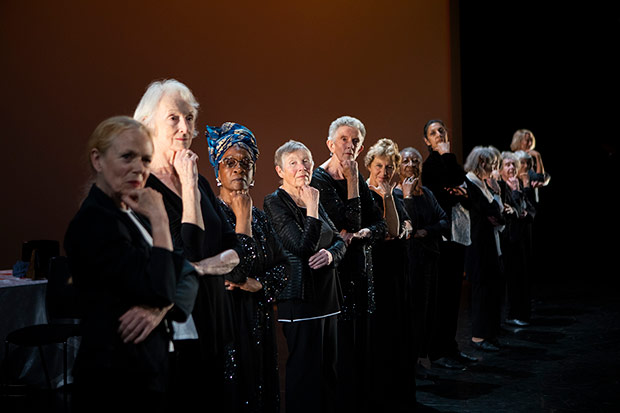
© Ellie Kurttz. (Click image for larger version)
Company of Elders
Dare I Speak, Natural 2019
★★★★✰
London, Lilian Baylis Studio
14 June 2019
www.sadlerswells.com/learning/learning-performing/company-of-elders
www.sadlerswells.com
Company of Elders, Sadler’s Wells’ resident over-60s company are a group of mature dancers who make the process of ageing seem like a creative project. Over the years that I’ve seen them, this extraordinary company of quirky individuals have become more adventurous about what they perform and flexible in how they perform, continuing to push themselves outside of their comfort zones with humour and enthusiasm.
Opening the Elixir Extracts Festival last weekend at the Lilian Baylis Studio, the Company of Elders pave the way for other older dance companies, all of which are non-professionals to celebrate dance as a creative force for older bodies. The Elders perform two works by international choreographers Alesandra Seutin and Portuguese based Clara Andermatt, which are both remarkable because of their experimental flare.
Seutin, director of Vocab Dance asks the dancers to embody rumba, political leaders and fashionistas from the Congo in Dare I Speak, investigating the recent history of the country. In an intriguing homage to all three, the performers enact segments of Patrice Emery Lumumba’s speech as prime minister of the Independent Democratic Republic of the Congo in 1960 which lead to his assassination in 1961. All dapperly dressed in tweed trouser suits, bow ties and glasses, they show through gesture, word and a multitude of facial expressions the political leader addressing his subjects to roars of support. But they also show the crowd’s role in the leader’s demise, a threatening mob of booing, angry, red handkerchief-waving people suggesting the fickle nature of human beings to destroy the people they once supported.
The strident rhetoric of this new Africanist leader and the appreciative reactions from his recently liberated people (from Belgian control in 1959) morphs into the celebrations – delicious moves and grooves of the Congolese rumba. With hips swaying, neat footwork and upper bodies held straight with dignity the performers travel across the stage either in a Conga line or shimmy off in pairs. Idiosyncratic gestures adorn the basic rumba steps, a dip of the shoulders, arm swings or lunges. At this point the group recall the flamboyant Congolese, ‘Sapeurs’ from the Society of Ambience-Makers and Elegant People – a sub- culture of dandies who dress up in expensive and fashionable clothes and pose in the streets, nightclubs and bars of Kinshasa. During the period of decolonisation in the 60’s, the Congolese dandies became more politicised, by imitating the dress of their former Belgium and French rulers, reclaiming their own identity from that of their colonisers.
Seutin rescues the rich, cultural traditions of the Congo from the negative, Eurocentric associations of a country shredded by poverty, violence and civil war but also reveals the performative versatility of the Elders. With their curiosity, openness and skill they embrace the challenge of embodying these African anti-colonialists throwing themselves into a different cultural terrain and defying any notion that older people are narrow minded or stuck in their ways.
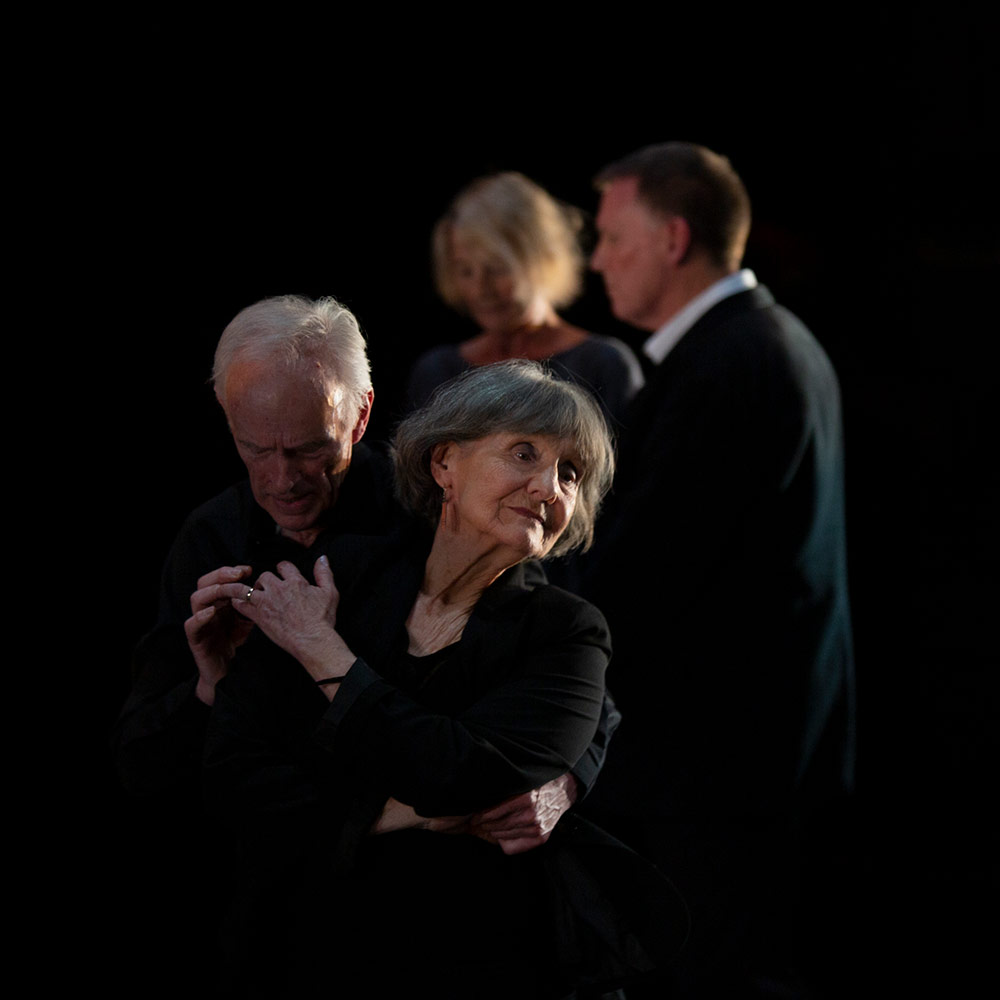
© Ellie Kurttz. (Click image for larger version)
Clara Andermatt’s Natural 2019 is a revival of a work that was made on the company in 2005, featuring personal anecdotes which are performed by each of the Elders, through movement, text or song. Andermatt crafted her material around interviews with each company member, using improvisation and theatrical devices to explore the body. Beautifully staged from start to finish, the work displays the dancers both as individuals but also a close-knit community.
Shimmering with elegance in evening attire, each dancer walks sedately on stage looking searchingly at the audience. Each one establishes a unique stage presence before they even begin to speak. We are given further insight into their characters as they confess what they either love or hate, which is both humorous and touching. One man says he likes Trump and Brexit as the others gasp in horror. Another woman says she likes suspender belts and others the NHS, grandchildren, bright colours and Frida Kahlo’s moustache. As they deliver their personal reflections, they cover a range of emotional states from wistfulness to irritation, optimism, nostalgia, pain and pleasure that is riveting to experience. They embellish their stories with performative sketches: Amina Patel shows us objects from Pakistan in her bag and explains what they mean to her; Betsy Field dances a solo which while at first tentative expands into a confident celebration of her dancing body; Sara Harris imagines her four-year old self singing a song she had learnt from her grandmother. As an audience we feel that we’ve really got to know them.
As they listen to each other, affirm each other’s confessional bravery with nods of support, comments, claps or hugs, they seem to belong to one big, productive family. Their ability to perform such challenging confessional work which is deeply exposing is even more impressive when you realise the improvised nature of much of it. What shines out is their sincerity and honesty in being themselves, their acceptance of each other and their irrepressible love of life which flows from their bodies and actions.
Andermatt creates Bauschian tableaux which form the backbone of the improvised content – the dancers sitting round a big dinner party table at the beginning and end, or forming a chorus line close up to the audience which frames their individuality more effectively. Her last staging success is the final scene in which the Elders leave the stage, their bodies now replaced by 19 ticking metronomes. The poignancy in those last moments as we wait for the metronomes to stop brings time itself to a standstill.

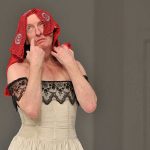
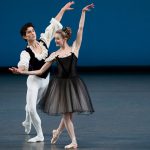



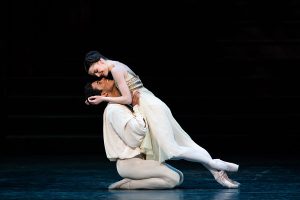
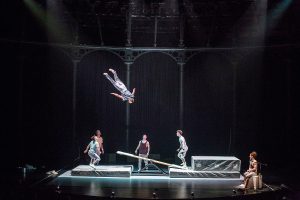
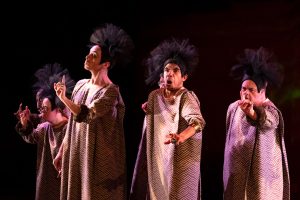
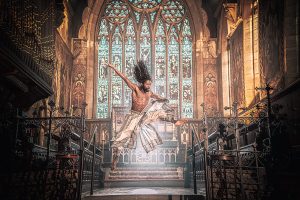

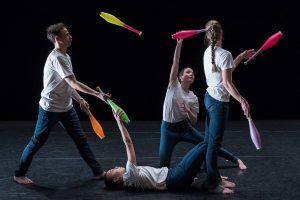
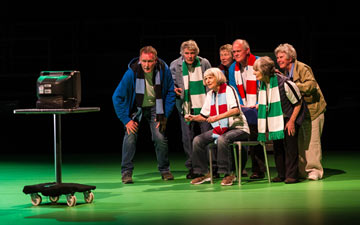

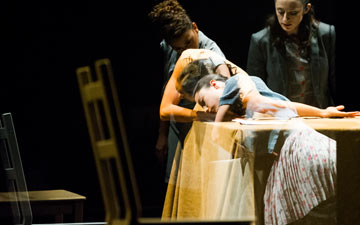
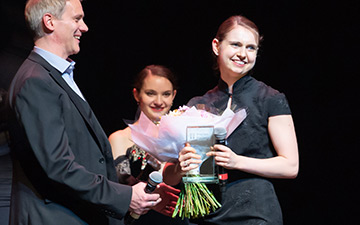
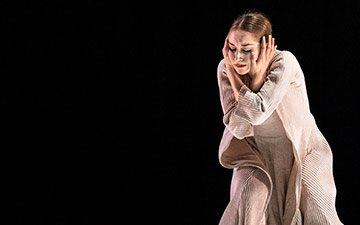
You must be logged in to post a comment.